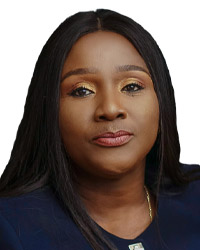Nigeria is Africa’s most populous country, ranked seventh in the world, with a forecast population of 230 million by 2025. With significant crude oil and natural gas reserves and major exports including cocoa, cassava and rubber, the country is a member of the Economic Community of West African States, the African Union, the Commonwealth, and the Organisation of Petroleum Exporting Countries.
Key factors making Nigeria an attractive investment destination include its median age of about 17 years, uninterrupted democracy since 1999, an unbanked population of about 64 million people, and significant deficits in key infrastructure such as power, housing and transportation.
Potential investors from South Korea can take into account several salient matters when considering investment in Nigeria including the ease of doing business, available investment incentives, foreign exchange considerations, the tax regime and enforceability of judgments.
EASE OF BUSINESS

Partner
Banwo & Ighodalo
Lagos
Tel: +234 12520795
Email: aowoigbe@banwo-ighodalo.com
Given the previous difficult terrain for doing business in Nigeria, the federal government established the Presidential Enabling Business Environment Council (PEBEC) in 2016 to spearhead reforms towards an enabling business environment.
The Enabling Business Environment Secretariat (EBES) was set up to implement the reform agenda of the PEBEC with efforts aimed at the removal of bottlenecks to doing business, moving up the World Bank Ease of Doing Business Index, and ensuring global competitiveness.
The EBES agenda was driven by various government ministries, departments and agencies focused on expediting the process for setting up a company, introducing electronic applications for construction permits, consolidating fees for registering title to property, promoting the ease of expatriate immigration, and reforms geared towards international trade.
Yet, while these reforms have improved the ease of doing business, other factors such as allegations of corruption, bureaucracy, multiple taxation, insurgency and kidnappings could dampen investor appetite.
FOREIGN INVESTORS
Foreign companies and individuals invest across a broad spectrum spanning greenfield and brownfield projects, the acquisition of shares and/or assets, providing debt financing and joint venture arrangements with Nigerian parties. Investments may be by way of foreign direct or foreign portfolio investment, and foreign investors participate in essentially all permissible sectors of the economy.
The process of establishing a business typically involves incorporation of a company, registration for tax, obtaining post-incorporation investment approvals (such as a certificate of business registration, business permit, expatriate approvals and resident permits) and industry-specific approvals depending on the business nature, protecting IP rights, securing business premises and employing personnel.
Businesses are organised in one of three broad forms, namely, sole proprietorships, partnerships and incorporated companies. Generally, foreign investors can wholly own a Nigerian company except in certain sectors such as oil and gas, aviation and shipping, where it is optimal to partner with Nigerians due to statutory and regulatory “local content” requirements in terms of shareholding or the makeup of a workforce.
Nigeria also has a well developed regulatory environment with authorities overseeing banking, insurance, telecoms and technology, energy (oil, gas and mining), aviation, maritime, investments and securities and antitrust, among others.
Other key advantages include a relatively robust financial services sector, availability of flights to major global hubs, and English as the official language. It is also noteworthy that payment of dividends is generally not subject to statutory limits, provided the company has sufficient profits and there are no reasonable grounds for believing it would be insolvent after the payment.
INVESTMENT INCENTIVES

Associate
Banwo & Ighodalo
Lagos
Email: iajiboye@banwo-ighodalo.com
Incentives available to investors include Pioneer Status, granted to eligible companies operating in industries or producing products or services deemed to be “pioneering” in nature. This status affords income tax holidays for an initial three years, renewable for an additional one or two years.
Incentives in the non-oil export category include: the duty drawback/suspension scheme, which enables exporters to claim a refund of import duty paid on raw materials and intermediate products imported for use in the production of finished goods for export; the manufacture-in-bond scheme, which affords duty free importation of raw materials for production of export goods; and the export expansion grant. Other incentives include import duty relief for businesses located within a free- trade zone.
Incentives in the gas industry potentially include: investment allowances on assets; exemption from value-added tax on plant, machinery and equipment purchased for gas utilisation; exemption from petroleum profits tax; and payment of royalties on gas transferred from a natural gas liquid facility to gas-to-liquids facilities.
Several other tax incentives are geared to encourage investment in the economy.
FOREIGN EXCHANGE
At the point of importing investment capital (foreign currency, raw materials or equipment), foreign investors are required to obtain an electronic Certificate of Capital Importation (e-CCI) in order to access the official foreign exchange later when seeking to repatriate dividends, interests, profits and/or capital. The e-CCI is obtained through an authorised dealer, which is typically a bank licensed by the Central Bank of Nigeria to operate in the forex market.
Corporate bodies, firms and individuals can operate domiciliary bank accounts denominated in foreign convertible currency.
Exporters of goods are required to open domiciliary accounts into which their export proceeds are paid. Generally, foreign currency domiciliary account holders have unfettered access to funds in their accounts.
It is noteworthy that foreign exchange cannot be presently obtained in the official market for certain imported goods such as rice, cement, private planes and tinned fish, among others.
Foreign management and technical services contracts must be registered with the National Office for Technology Acquisition and Promotion (NOTAP) for payments under such contracts to qualify for foreign exchange remittance in the official market. Based on the NOTAP guidelines, allowable management and similar fees include but are not limited to 2% to 5% of profit before tax for approved management services, and up to a maximum of 5% of the project cost for consultancy services.
Expatriates working in Nigeria can also remit 100% of their income net of tax as personal home remittance unless the expatriate has obtained a residence permit and is in Nigeria with a spouse.
TAX REGIME
There are three levels of taxation: federal, state and local government. The federal government assesses and collects companies’ income tax, tertiary education tax, personal income tax (only in respect of persons employed in the Nigeria Army, Navy, Air Force, Police and officers of the Nigerian Foreign Service), capital gains tax (by companies), value-added tax, petroleum profits tax, customs duties (import, export and excise duties) and stamp duties (transactions by corporates).
The Internal Revenue Service offices of the states and federal capital territory assess and collect personal income tax on the income of resident individuals, while local governments assess and collect miscellaneous taxes, levies and rates such as tenement rates.
In recent years, through the instrumentality of several Finance Acts, progressive amendments have been made to the tax regime in a bid to align with global best practices.
ENFORCEMENT OF JUDGMENTS
Generally, foreign judgments of the courts of commonwealth and other foreign countries are enforceable, provided (among other conditions) that substantial reciprocity is accorded to judgments of Nigerian superior courts in the relevant foreign jurisdiction.
A party seeking to enforce a foreign judgment is required to file an originating application within 12 months of the date of delivery of the judgment, or such longer period permitted by the court.
Similarly, international arbitral awards are enforceable pursuant to the Arbitration and Mediation Act, which domesticated the New York Convention on the Recognition and Enforcement of Foreign Arbitral Awards, subject to certain circumstances in which the court may refuse to recognise or enforce an award.
TAKEAWAYS
General elections were held earlier this year, which saw Bola Ahmed Tinubu elected as president. Other elected officials include state governors and representatives at the federal and state legislatures.
The new administration has so far implemented certain economic reforms, particularly removal of the government-funded subsidy on the price of premium motor spirit (petrol) and efforts towards achieving convergence of the official and parallel currency exchange rates.
The president also recently embarked on visits to France, India and the United Arab Emirates to discuss investment opportunities in Nigeria. One outcome of these visits was the promised investment of USD14 billion by India.
While some economic reforms have in the short term caused hardship, it is expected that the disciplined channelling of significant subsidy savings – potentially NGN400 billion (USD5.1 million) monthly – towards education, healthcare, power and infrastructure, alongside continued progressive reforms, will bolster investor confidence in Nigeria, leading to renewed interest, collaboration and ultimately investment.
BANWO & IGHODALO
48, Awolowo Road, South‑west Ikoyi
Lagos Nigeria
Tel: +234 12520795, +234 8139841360; 8139841361;
8139841362; 8139841
www.banwo-ighodalo.com





























